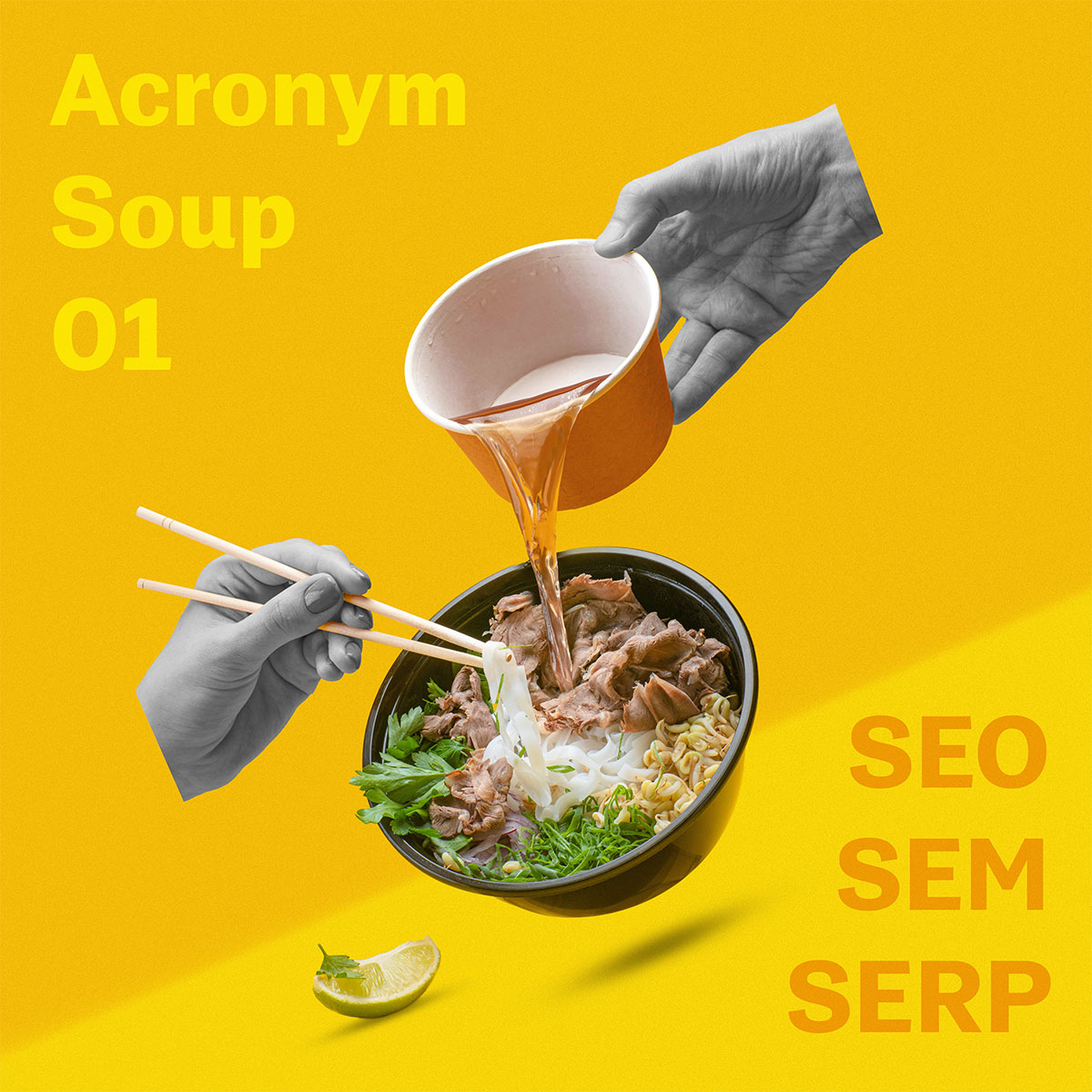July 12, 2024
Human Friend Digital Podcast
Acronym Soup 01 – SEO, SEM, and SERP

Explaining what SEO, SEM, and SERP stand for.
Hello there; we invite you to listen to our new series, “Acronym Soup.” Join Jacob and Jeffrey as they navigate the often-confusing world of digital marketing acronyms: SEO, SEM, and SERP.
Jacob starts by demystifying SEO –Search Engine Optimization — the ways to get your site to show up on search engines. Then, Jeffrey jumps in, sharing his early escapades with SEM –Search Engine Marketing — which can feel like paying tolls on the digital freeway. Lastly, they break down SERP — Search Engine Results Page — where and how all your hard work is displayed.
With plenty of humor and insightful advice, they attempt to make these complex concepts accessible and entertaining. Whether you’re new to digital marketing or a seasoned pro, this episode has valuable tips and laughs along the way. Hit play and enjoy!
Episode Transcript
View Full Transcript
Jacob:
Welcome to Acronym Soup. This is our deep dive into a handful of acronyms that plague digital marketing.
Jeffrey:
Plague me as your employee because I don’t know any of these terms.
Jacob:
Right. And if you’re new to digital marketing, this series is to help you get your feet wet into all these topics and understand what they mean a little bit beyond just a definition of each acronym. So today’s episode… Jeff, I’ll let you.
Jeffrey:
Yeah, today we’ve got SEO, SEM, and SERP. So…
Jacob:
Right. They’re all related. So they get thrown around interchangeably a ton. And for SEM, there’s also a service called SEMrush, which makes it even more confusing for newbies that come into the space.
So let’s start with SEO: that’s the word that gets thrown around the most in digital marketing, that is, Search Engine Optimization. That term is really broad and it covers almost anything that has to do with optimizing your website for search, but that’s just part of it. There’s also like, local maps optimization is a part of a search results and everything that you can do in there. So the term gets thrown around really broadly, and people are sometimes called SEOs– and that is a person like me, I’m an SEO– and that gets thrown around loosely… which then leads directly into the next term SEM, which is Search Engine Marketering (sorry, I tried to say the word “marketing” and “marketer” at the same time).
Jeffrey:
Because you’re a marketer, and you’re in marketing.
Jacob:
And that’s the problem with pretty much all of this stuff, because they get thrown around so much. But, search engine marketing is anything that markets on the search engine. So that also can include like, pay per click, display advertisements, and pretty much anything else that shows up on search. And that is all dictated by SERP, what’s on the Search Engine Result Page.
So, if someone talks about SERP, like SERP features, that would definitely be S E R P. So that can be AdWords. That can be the information things, SERP…
Jeffrey:
It’s just funny to pronounce it out loud, like it’s a word: “SERP”.
Jacob:
Oh yeah. People will say it SERP that way too, and it definitely threw me off when I was originally doing this.
I remember being on as a young account manager with the owner of the first agency I was with, and he started talking about SERP as that, and the client was already educated on it, and I felt like a total idiot and just got really quiet during that time of the call, and I was like quietly Googling off to the side on the video call to be like “what is SERP?”.
Jeffrey:
So, well, that was me, on our first client call. You were throwing around all these acronyms– I forget which call it was, or which client it was– but I was just like, “I don’t know what any of these words are”, and you just threw me into the deep end, I was frantically Googling on the side of the Zoom call.
Jacob:
Yeah, exactly. And that’s what happens to a lot of people when they first dive into this stuff. And people that are experienced throw those acronyms around a lot interchangeably.
So let’s go back to the beginning.
Jeffrey:
Yeah, let’s start with SEO.
Jacob:
So SEO. So now you’ve got the whole landscape. So what is in search engine optimization? And that is all the things you can do on your website to prepare it for better indexing in the search algorithms.
Jeffrey:
All right. So indexing…
Jacob:
Yes. So indexing is kind of like… well it’s modeled off the real world thing, like an index, “let’s go to the back of your textbook” and index is usually alphabetized in the back of a book, and it’s a list of everything that’s in its database, in its data of the book, right? And that is what you’re doing: you’re putting your website into the search engine index, for like Google or Bing.
To prepare for indexing, you do things like optimize page titles, meta descriptions, you change the page content, alt text– which is like the code that tells Google what an image is, that is on your website. So we’ll have meta, page titles, alt text, content on the page, and how fast your website loads, and the design of the website. And they even do things like, the usability of your website now for mobile usage, and like, can people actually, with their big fat fingers, click the right things. Right?
Jeffrey:
Right. So it’s not just talking about the words that are on your website, but also the utility of your website, whether that’s on a PC or does it…
Jacob:
Oh, I’m sorry. You’re looking for the word usability.
Jeffrey:
Oh, maybe I am.
Jacob:
Yeah, no, that’s like for user-interface. We’ll get into UI, UX, and that kind of user experience, and other acronyms that we’ll get into later.
But yes, that is actually a factor in it now, and they’re getting better at detecting that and using that as a part of the indexing process. So, like I said, you do all those things, that search engine optimization, to get indexed in there, and then you’ll show up on the search engine result page. That’s where you go in the end.
Jeffrey:
The SERP.
Jacob:
Yes. So the in-between land of these things is search engine marketing, and that encompasses everything that’s on the SERP result page that you’re taking advantage of. So an SEO just optimizes that website for indexing to do the best it can possibly do to rank well. And I should have said, SEO should also include link-building, sorry about that.
Jeffrey:
Link-building…
Jacob:
Yes. Link-building is basically getting links from other people’s website to point to your website
Jeffrey:
Right, because that makes you rank higher when you have people linking to you, it counts better. And we talked about this on one of our other episodes, but, yeah.
Jacob:
Yeah, so that would be considered like “authority score”.
Jeffrey:
Authority score, okay.
Jacob:
That’s an amalgamation of your links and your SEO efforts in a given… for your website. But we’ll do that on another thing. That’s like an SEMrush data set, blah, blah, blah, blah, blah.
So SEM, search engine marketing, or being a search engine marketer, is going beyond that. You’re doing like, pay-per-click, if you are an e-commerce website, you’re getting into that Google marketplace for the e-commerce listings in there, you’re showing up on anything that can show up on a search engine page, a search engine marketer is going to be about. So there’s maps, there’s pay-per-click, there’s information panels, there’s FAQs…
Jeffrey:
Can you define pay-per-click? I know we’re going to get into this on another episode.
Jacob:
Yes, so like you said, we’ll get into it in another episode, but pay-per-click is simply paying per click in the ad-space. So when you type in a Google search result, you’ll see sponsors, sponsored ads, little… it’ll be like that little gray texts off to the side,
Jeffrey:
Yeah and i always avoid all of them because I’m like “I’m not clicking on this.”
Jacob:
Yeah, but a lot of people do, but a lot of people don’t. Because, I would say that that space has gotten even larger over time. But every time someone clicks on that, they have to pay per click.
Jeffrey:
Who’s paying whom?
Jacob:
The advertiser is paying Google for your click. So if Google can get– or Bing, or whoever is doing your pay-per-click campaign– if Google can give you a click, you will have to pay for that click.
Jeffrey:
All right.
Jacob:
But we’ll get to that in another one. But that’s all part of search engine marketing. And a good example, if you want to see everything that entails search engine marketing: check out the tool SEMrush– I use SEMrush, it’s one of my favorite search engine tools– and look at everything that they offer, which is a lot. And that is everything that goes into search engine marketing: they really don’t leave anything out. So if you need to get a quick rundown of everything that’s involved in that, SEMrush is a great place to check out.
Jeffrey:
I think that wraps up episode one.
Jacob:
That’s episode one. Acronym soup.
Jeffrey:
Thanks for tuning in.
Almost never miss an episode!
Well, we're only human.
Subscribe to receive emails in your inbox when every new episode drops ... or when we want to send you obnoxious emails to sell you stuff you don't really need.
Just kidding, we respect the privilege of being in your inbox.
Email Subscribe
"*" indicates required fields

